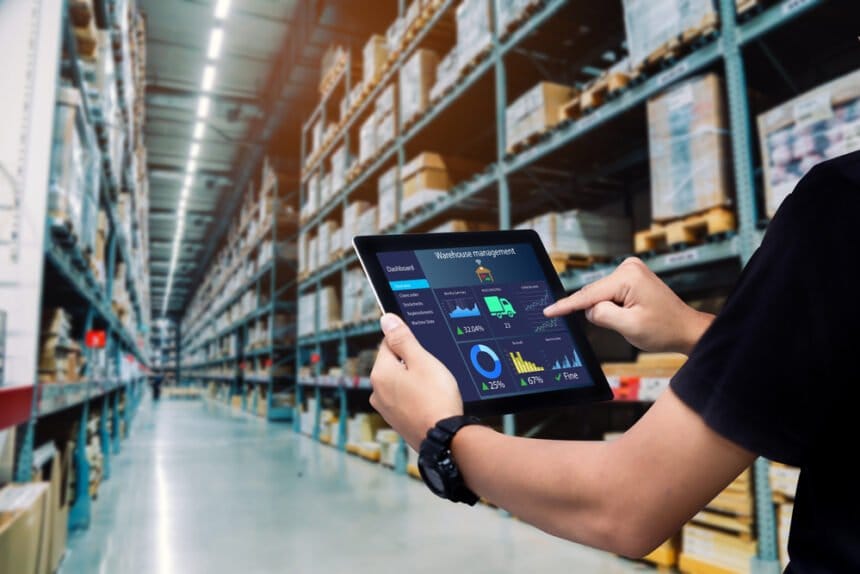Big data has driven major changes in the e-commerce sector in recent years. E-commerce brands spent over $16 billion on analytics in 2022 and are projected to spend over $38 billion by 2028.
One of the biggest benefits of data analytics is that it can help e-commerce brands optimize their logistics and fulfillment processes. Keep reading to learn more.
Big Data Drives Huge Changes in E-Commerce Fulfillment Processes
The global e-commerce market has been growing steadily in the post-pandemic retail sphere, with recent reports stating that 20.8% of all global retail sales will be conducted entirely online during 2023, representing a yearly growth rate of around 2% with figures expected to climb to 24% by 2026. Advances in big data have played a huge role in this shift.
We talked about some of the changes that data centers have brought to the e-commerce sector. However, data is also transforming the nature of fulfillment warehouses.
As more consumers begin to alter spending habits by seeking out and purchasing more of their goods online, e-commerce retailers of all sizes must continue to expand their operations to keep up with demand. As warehouses grow, larger quantities of products and sensitive digital data must be reasonably secured, leading e-commerce retailers to invest in more proactive security measures.
In the modern world, it’s no longer enough to simply install a few cameras and hire a team of security guards, in fact modern security teams must be well-prepared to handle increasing numbers of both physical and cyber security attacks. This article will discuss four ways that e-commerce companies can better protect their logistics and fulfillment warehouses using converged security technologies.
Operate cloud-based security systems
All logistics and fulfillment warehouses will be used to store both physical goods and large amounts of identifiable customer data, both of which are likely to draw the attention of hackers and criminals. To reliably protect assets from outside threats, integrated and managed security systems are essential.
By developing and installing managed access control devices, security staff are able to verify the identities of all individuals entering and exiting secured areas, with modern systems providing additional features such as automatically recorded access logs and triggered lockdown functions.
Access control systems can be made even more effective by optimizing operations using cloud-based management platforms, from here, admins will be permitted to issue, adjust and revoke permissions as well as view relevant system data via smart devices from anywhere with an internet connection.
A further benefit to the operation of a cloud-based management platform is the ability to develop integrated security systems spanning several different devices. File storage rooms and restricted areas can be secured behind access readers, with these systems linked to security cameras allowing for further identity verification, with both systems monitored remotely from one management platform.
By utilizing physical security controls like ONVIF security cameras and IP access control readers, individual hardware units developed by different manufacturers can be integrated together to create bespoke security networks, allowing security and IT teams to automate workflows across multiple devices and actively manage all systems remotely from a single easily navigated cloud-based operating platform.
Coordinate cyber and physical security teams
In the modern world, data has become just as valuable to criminal networks as physical goods themselves, leading business owners to completely rethink how security teams should be structured. Physical guards and security professionals will still be required to effectively secure warehouses and business properties, though the policies that they follow will have a direct impact on cyber defenses.
An example of this can be found in the operation of cloud-based physical security systems like access control. On-site security teams may well be prepared to prevent intruders from physically breaching installed devices, with support from CCTV and access logs, though they may not be equipped to identify or prevent hackers from accessing these same networks to steal associated digital data.
Security policies and protocols should be planned and shared across both cyber and physical security teams to ensure that all active networks and devices are reasonably protected from all kinds of threat. By developing a converged security team, IT staff are able to advise security teams how best to manage and operate physical systems to better detect and prevent attempts to steal digital files.
The coordination of a converged cyber and physical security team allows e-commerce businesses to share information and techniques when developing effective security policies and should be utilized when planning or upgrading new security systems to ensure that any potential exploits are reasonably covered, and relevant security protocols are in place to minimize the impact of attempted breaches.
Develop converged cyber and physical security policies
Alongside instigating converged physical and cyber security teams, e-commerce businesses must consider utilizing the knowledge base of both groups when planning, improving and developing active security policies. Converged teams can manage all types of security threat in unison, including instances where physical and cyber threats overlap, allowing for coordinated incident responses.
Physical security teams may wish to install wireless access control systems linked to IP surveillance cameras to improve their own workflows, but by consulting cyber security specialists when developing these networks, a converged team may highlight potential weaknesses in the system that could be exploited by hackers. Combining both knowledge sets allows teams to make informed decisions.
Strategies can be planned and formulated from inception to implementation with both physical and cyber security threats equally considered throughout. Physical security staff can explain which devices and policies may allow them to perform best in their roles, and cyber security teams can help to build these systems with fail safes in place to reduce the workload on both security departments.
By ensuring that all security staff have good knowledge of current physical and cyber security best practices, faster and more accurate incident responses can be planned, and e-commerce businesses will be free to scale operations with a reduced risk of new exploits being revealed as systems grow.
Leverage integrated data to automate security responses
One of the most useful benefits found as a direct result of developing converged security systems, policies and strategies will be the sheer amount of informed data that businesses are able to gather and utilize when creating workflow efficiency improvements and fully automated security responses.
By implementing an integrated cloud-based security system formed from several unique security devices like access control, CCTV, on-site alarms and cyber security defenses, businesses can collect relevant data from each system and combine findings in one integrated management platform.
This means that system use data collected from one security device can be used to automatically inform the response of another, for example, if perimeter security cameras identify suspicious activity outside the property this data can be used to trigger an alarm or alert staff via cloud-connectivity.
Leveraging integrated data to automate certain security functions will lessen the workload of security staff without affecting the efficacy of incident responses, allowing teams to divert resources to additional tasks. For example, large companies like Walmart can keep customer service desks open for longer. Real-time alerts may be programmed to warn staff of attempted breaches and relevant security officers can be granted access to the wider cloud-based management portal to view and adjust features remotely using only their smartphones.
Data Analytics is Changing the State of E-Commerce Fulfillment
The e-commerce market is only set to grow larger in the coming years, so as more businesses begin to consider expanding their operations into larger and more fitting environments, more time should be spent improving physical and cyber security systems to handle greater volumes of products and data.
To ensure that teams are able to reliably detect and prevent potential security threats, as well as scale their workflows in line with company growth, developing converged security systems and responses should be considered to guarantee all important decisions are informed by useful data.
By implementing cloud-based management systems, multiple security devices can be connected and controlled from one easily navigated platform, and integrated data can be viewed and used to automate incident responses and improve the overall efficacy and efficiency of all security teams.










